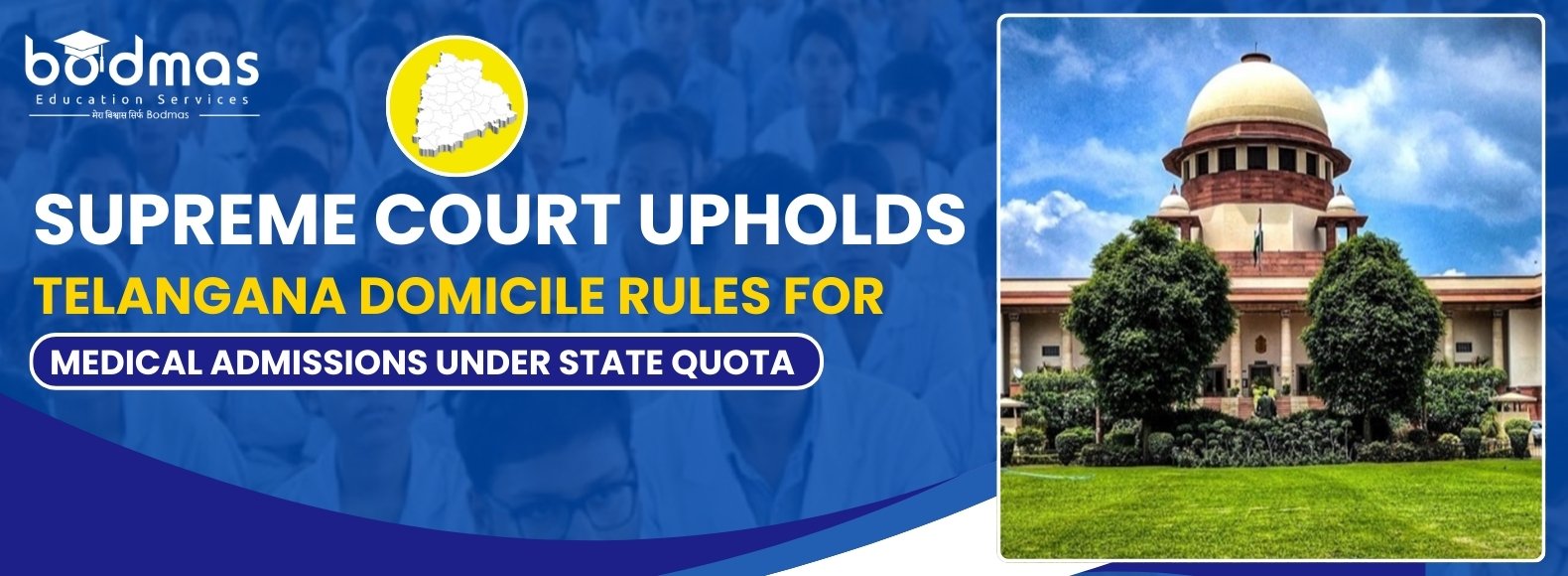Supreme Court Upholds Telangana’s Domicile Rule for Medical Admissions Under State Quota
The domicile rule by the Telangana government, that the students need to have studied in the State during the four years before Class 12 to be eligible to join the medical and dental colleges under the State quota, has been upheld by the Supreme Court of India. This ruling, passed on 1st September 2025, resolves persistent controversies over the eligibility requirements of local applicants when seeking admission into MBBS and BDS programs. We present a detailed summary of the decision, the legal context, the arguments and its effects on medical admissions in Telangana, below.
Supreme Court Judgment and Key Details
The State had its appeal admitted and its validity of the amended 2017 Rules accepted, which amended the previously valid 2014 Rules, by a Bench consisting of Chief Justice of India B.R. Gavai and Justice K. Vinod Chandran. The impugned guidelines limit entry based on the State quota to students who have taken Classes 9-12 in Telangana, which qualifies them to be local candidates for MBBS and BDS programmes. The Bench said that both impugned high court judgments are put aside and that the appeals of the State and the university are permitted. The writ petitions of the students are thrown out.
The decision also made it clear that no concession made to the government to alleviate hardship by offering admissions made during the last academic year would be upset. This provides continuity to those who are already under transitional provisions.
👉 Scroll smarter! Follow us on Instagram
Prior Interpretation and Decision of High Court
In its previous ruling, the Telangana High Court had observed that the regulations were discriminatory in that they did not cover students whose parents were residents of the State but had temporarily attended schools outside Telangana, frequently to take preparatory courses for the medical entrance examinations. A Division Bench led by Chief Justice Alok Aradhe and Justice J. Sreenivas Rao refused to quash, in full, Rule 3(a) of the 2017 Rules, which sets the requirements of a local candidate. The judges argued that so doing would unintentionally open State quota seats to nationwide students.
Rather, the High Court interpreted a rule to the effect that permanent residents of Telangana were not bound by the four-year study requirement. This was considered to be in line with Article 371D(2)(b)(ii) of the Constitution that gives powers to States to institute special provisions in their educational institutions concerning local candidates.
Rationales and Concerns of Supreme Court
When the Supreme Court overturned the order of the High Court, it emphasised that the lack of a statutory definition of residence and a prescribed scheme of issuing residence certificates would lead to an anomalous condition. This would make the home reservation untenable and subject it to a lot of litigation. In the case, which was decided by Justice K. Vinod Chandran, the possibility of misunderstanding and conflicts in the absence of specifications was highlighted.
The Court observed that one more amendment suggested by the State government was introduced to Rule 3, with a proviso. This exception allows applications that completed their four years of study outside Telangana to still be counted as locals as per certain criteria. These are children of employees of the State government, officers of the All India Services, defence officers or employees of State corporations and agencies who are liable to all-India transfers. The decision observed, the said proviso should assuage and ease the complaints of those who allege that they were brought out of the State by force of the migration of their parents by reason of service in Government/All-India Services/ Corporations or Public Sector Undertakings that are instruments of the State of Telangana as well as defence and paramilitary services whose nativity is attributable to the State.
👉 BODMAS Education Telegram community and never miss an update…
Arguments on both sides
In its appeal, the Telangana government contended that the broadening of the definition of local candidate by the High Court was a violation of the special protection of Article 371D, which was aimed at giving students who were indeed part of the educational system of the State preferential treatment. This is to protect local interests in access to education.
On the other hand, the students argued that the rule was too inflexible and did not take into consideration situations like transfers of parents in government or in allied services. Such circumstances normally compel children to attend school outside Telangana even though they have good family and residential links to the State.
References to the Constitution and Wider Implications
The decision cites Article 371D(2)(b)(ii) of the Constitution that gives States the power to provide local candidates in schools. The Supreme Court supports the capacity of the State to determine eligibility under educational residency by enforcing the 2017 Rules as amended and the new proviso tackles this issue of equity in regard to certain groups.
In the case of medical admissions, this ruling upholds the integrity of the State quota system, which places students who have a long history with the education system of Telangana at the forefront. It helps to prevent unfairness to victims of the inevitable changes in residence because of parental work, minimising the chances of additional court proceedings. Medical education stakeholders can anticipate a more organised system of domicile-based reservations that would correspond to the constitutional protection.
Staying Informed
This landmark decision highlights the trade-off between state specific protection and fair access to medical education. To keep up to date on implementation, including the official announcement of the Rule 3 proviso, follow official sources, such as the health department of the Telangana government or the portal of the Supreme Court of India. The entire judgment can also be used by legal and educational professionals to provide insight into the domicile policies.
📞 Contact us today and take the first step toward your dream career! 🚀Have Questions? Ask Us!
_1743598199.jpeg)
We're Here for You
Powered by Froala Editor




